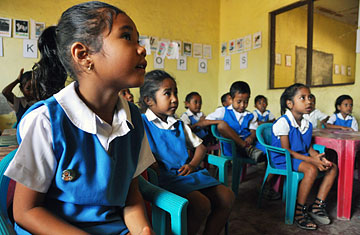
An elementary school in Manatuto, East Timor, is among just a few in the country to formally make the community's indigenous tongue the main language of instruction in early grades
(2 of 2)
"We need to create an environment in the classroom where children can express themselves [and become] thinking, contributing citizens for one of the youngest countries in the world," says Kirsty Sword Gusmão, an Australian-born former social activist married to East Timor's Prime Minister. The First Lady is chair of East Timor's UNESCO commission and has spearheaded the effort to change language policy for the country's schools. She says inveterate biases instilled by colonialism are one of the main obstacles to the program's gaining support. Many parents believe their children are taking a step backward, she says, by receiving an education in their indigenous language, which they often see as primitive. But that perception can change when parents see improvements in how their children engage in a classroom that uses their mother tongue.
In the district capital of Manatuto, the main elementary school is among a few across the country where the community has decided, through a public consultation and vote, to have lessons in early grades taught mostly in their local language, Gololei. "It means our local language and identity will not be lost," says Gaspar da Costa, 52, who has two sons attending the school. One of the school's teachers, Inocencia Sequeira Miranda, says the change has spared her from the awkward pauses that used to silence her lessons. "It was difficult because Portuguese wasn't even a language that I knew well. When I spoke, the students would just stare at me with a blank look on their faces," she says. "Now I'm more confident, and it's easier for the kids to understand."
That children learn best in their first years of school in their household language has been "proved time and time again in countries worldwide," says Robert Phillipson, a professor of linguistics of Copenhagen Business School and author of Linguistic Imperialism. He says that studies of primary schools in India and Nepal have shown that children benefit most from their education when it is conducted in the language of their community. He also points to Zambia's education system, which he says has outperformed that of its neighbor and fellow former British colony Malawi by making more room for local languages in schools. "The evidence is that if you grant people rights to use their indigenous languages, it does no harm to the state," Phillipson says. "It's not a recipe for the country to be disintegrated."
Whatever empirical and anecdotal evidence exists in support of a countrywide shift in language policy, many East Timorese remain skeptical. "The intention is very good, but in practice it will be very difficult to implement," says Ceu Federer, who at times during the Indonesian occupation served as a courier between resistance groups. In some communities, students don't share a common first language and, more significant, most of East Timor's indigenous languages are limited to oral communication, with little or no script. Federer, who is fluent in Portuguese, also points out that Tetum has numerous loan words from Portuguese, which makes teaching in the European language less formidable.
There are also suspicions that deeper motives are behind the proposed language-policy changes, says Augustinho Caet, an official at the Ministry of Education who is at odds with some of his peers in the government in pushing for this change. "[Some people] think we are going to replace the official languages," he says. "That is not what we aim to do. We aim to help them learn better Portuguese and Tetum." The resistance Caet anticipated has materialized. A parliamentary resolution in August reiterated the country's original language policy and, pointedly, said Portuguese had a fundamental historical, social and political role in East Timor and that any changes to the language's official place "would condemn the country to irrelevance and, eventually, to subordination." Even amid this opposition, Sword Gusmão and Caet are introducing a pilot mother-tongue program in a dozen more schools across the country this year.
East Timor is still grappling with its traumatic history, and framing and reframing its antioccupation resistance narrative. Language plays a central part in this story, says Max Stahl, a British video journalist whose 1991 footage of Indonesian soldiers massacring East Timorese helped bring international attention to the occupied nation's plight. "East Timor desperately needs to consolidate its identity as a state," he says. How this effort is waged through classroom language policies could fundamentally change the script for East Timor's history, present and future.
